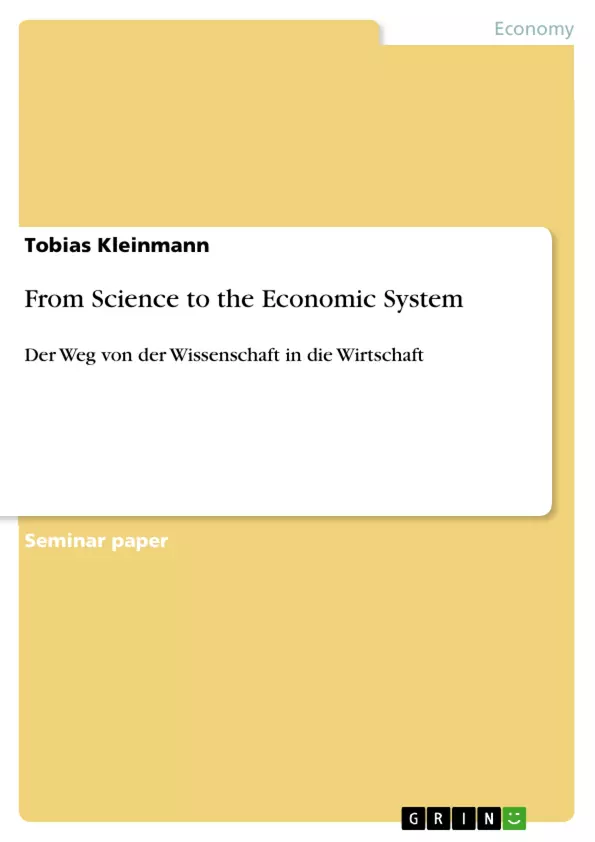There has been a conspicuous increase in patenting and licensing, which is an indicator for an aggrandisement of academic entrepreneurship at American research universities since the 1970s. The number of patents which can be issued to universities and colleges increased by more than 100 percent between 1979 and 1984, as well as between 1984 and 1989. It almost doubled once more during the 1990s. In 1980 only about 20 research universities had technology licensing and transfer offices. 10 years later that number was 200, and in 2000 just about every major research university had founded its own (Colyvas et al., 2002, P. 1). University license revenues have increased from $220 million to $698 million from 1991 to 1997 (Association of University Technology Managers, 1998).
Private sector activity is always associated with the risk of failure because of the responsibility which is connected with it. This leads us to the discussion why academics should escape from a “safe world” of their publicly financed institution to either become entrepreneurs or to work in private companies. What are the major reasons for the risk of entrepreneurial and private sector activity? The following paper tries to find an answer on this question by blending theoretical backgrounds and empirical elements.
The second chapter serves as an introduction to the subject where the issue of the paper is narrowed further down and the key questions of it are defined. The main characteristics and concepts will also be distinguished in the second chapter, as much as it will be presented which aspects are not discussed in the paper. The third chapter of this paper concentrates on how internal and external factors influence the decision of scientists to show entrepreneurial behaviour. There are different theories and surveys which try to find an answer to the question how important different elements are. The fourth chapter works out the details in differences of the factors leading either to academic spinoffs or private firm participations. The conclusion gives the final answer on how the theory and the empiricism correspond with each other and which reasons are responsible for academics to break out from the ivory tower of science.
Inhaltsverzeichnis (Table of Contents)
- Introduction
- Academic Science vs. Private Sector Activity
- Possible factors for Private Sector Activity
- Connecting theory and practice approach
- Internal Factors
- Scientific Mobility and Academic Entrepreneurship
- Experience in Research Commercialization
- Commercial Orientation of Colleagues
- External Factors
- Research Field
- Geographic Location
- Entrepreneurship vs. Working in Private Firms
Zielsetzung und Themenschwerpunkte (Objectives and Key Themes)
This paper examines the factors that motivate academics to pursue careers in the private sector, moving away from traditional academic research. It delves into the reasons behind the shift towards commercialization of scientific research and the increasing role of academic entrepreneurship. The analysis focuses on the influence of both internal and external factors on these decisions.
- The motivations of academics to pursue private sector careers.
- The factors that influence the decision to engage in entrepreneurial activities.
- The role of internal and external factors in driving academic entrepreneurship.
- The differences in factors leading to academic spinoffs vs. private firm participation.
- The impact of policy changes on academic entrepreneurship.
Zusammenfassung der Kapitel (Chapter Summaries)
- Introduction: This chapter introduces the concept of academic entrepreneurship and the growing trend of academics transitioning to the private sector. It highlights the significance of commercializing research results and the role of universities in fostering this transition.
- Academic Science vs. Private Sector Activity: This chapter explores the reasons behind the shift from traditional academic research to private sector activity. It discusses the increasing demand for specialized research and the potential for commercializing scientific discoveries.
Schlüsselwörter (Keywords)
The key terms and concepts explored in this paper include: academic entrepreneurship, scientific research commercialization, private sector activity, internal and external factors, university spinoffs, policy changes, and the Bayh-Dole Act.
Frequently Asked Questions
What is academic entrepreneurship as defined in this paper?
Academic entrepreneurship refers to the increasing trend of patenting, licensing, and technology transfer at research universities, where scientists engage in commercial activities or transition to the private sector.
How did university patenting activity change since the 1970s?
The paper notes a conspicuous increase, with patents issued to colleges increasing by over 100 percent in five-year intervals during the 1980s and doubling again in the 1990s.
What are the internal factors influencing a scientist's decision to become an entrepreneur?
Internal factors include scientific mobility, personal experience in research commercialization, and the commercial orientation of a scientist's colleagues.
Which external factors drive academics toward the private sector?
Key external factors identified are the specific research field of the academic and their geographic location relative to industry hubs.
What role did the Bayh-Dole Act play in this context?
The paper explores how policy changes like the Bayh-Dole Act impacted academic entrepreneurship by facilitating the commercialization of publicly funded research.
What is the difference between academic spinoffs and private firm participation?
The research analyzes distinct motivating factors that lead either to the creation of a new university spinoff company or to a scientist joining an existing private firm.
- Citation du texte
- Tobias Kleinmann (Auteur), 2010, From Science to the Economic System, Munich, GRIN Verlag, https://www.grin.com/document/154486



